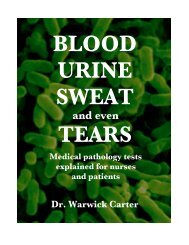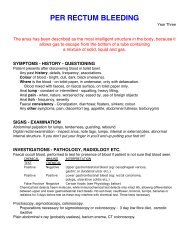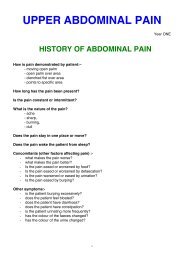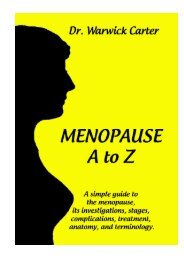MALE GENITOURINARY SYMPTOMS - Medwords.com.au
MALE GENITOURINARY SYMPTOMS - Medwords.com.au
MALE GENITOURINARY SYMPTOMS - Medwords.com.au
Create successful ePaper yourself
Turn your PDF publications into a flip-book with our unique Google optimized e-Paper software.
<strong>MALE</strong> <strong>GENITOURINARY</strong> <strong>SYMPTOMS</strong><br />
The symptoms vary significantly between men and women.<br />
In women there may be minimal symptoms with a mild attack, but when symptoms do occur they include a foul<br />
discharge from the vagina, pain on passing urine, pain in the lower abdomen, passing urine frequently, tender<br />
lymph nodes in the groin, and fever. If left untreated the infection can involve the uterus and Fallopian tubes to<br />
c<strong>au</strong>se salpingitis and pelvic inflammatory disease, which can result in infertility and persistent pelvic pain. Babies<br />
born to mothers with the infection can develop gonococcal conjunctivitis (eye infection).<br />
In men symptoms are usually obvious with a yellow milky discharge from the penis, pain on passing urine and,<br />
in advanced cases, inflamed lymph nodes in the groin. If left untreated the prostate can be<strong>com</strong>e infected, which<br />
can c<strong>au</strong>se scarring of the urine tube (urethra), permanent difficulty in passing urine and reduced fertility.<br />
With anal intercourse, a rectal infection with gonorrhoea can develop and c<strong>au</strong>se an anal discharge, mild<br />
diarrhoea, rectal dis<strong>com</strong>fort and pain on passing faeces.<br />
Oral sex can lead to the development of a gonococcal throat infection.<br />
Gonorrhoea may also enter the bloodstream and c<strong>au</strong>se septicaemia. An unusual <strong>com</strong>plication is gonococcal<br />
arthritis, which c<strong>au</strong>ses pain in the knees, ankles and wrists. Other rarer <strong>com</strong>plications include infections of the<br />
heart, brain and tendons.<br />
The diagnosis is confirmed by examining a swab from the urethra, vagina or anus under a microscope, and<br />
culturing the bacteria on a nutrient substance. There are no blood tests available to diagnose gonorrhoea. Other<br />
sexually transmitted diseases should also be tested for when gonorrhoea is diagnosed, as they may be contracted<br />
at the same time. For this reason, blood tests are often ordered when treating anyone with any form of venereal<br />
disease.<br />
Gonorrhoea has been readily treated with a course of penicillin until recently, but many strains are now<br />
resistant to penicillin and more potent antibiotics (eg. spectinomycin) are required. All sexual contacts of the<br />
infected person need to be notified as they may be carriers of the disease and unaware of the presence of the<br />
infection. After treatment, a follow-up swab is important to ensure that the infection has been adequately treated.<br />
The appropriate antibiotics can cure more than 95% of gonorrhoea cases.<br />
IMPOTENCE - PSYCHOGENIC<br />
Impotence is the inability of a man to obtain a firm erection of the penis when sexually stimulated. It is a very<br />
<strong>com</strong>mon problem, and something that every man experiences at some time, particularly in middle age and older.<br />
The process of erection sometimes mystifies women. It is one over which the man has no direct control, as it is<br />
a local reflex in the pelvis triggered by sexual excitement. A man even has difficulty in detecting if his penis is erect<br />
unless it is touched or seen. The penis contains two s<strong>au</strong>sage shaped sponge filled tubes (corpora cavernosa) that<br />
fill with blood under pressure when a muscular ring closes off the drainage veins behind the base of the penis.<br />
A wide range of diseases may c<strong>au</strong>se impotence, and these must be excluded by appropriate investigations<br />
before a psychological c<strong>au</strong>se is diagnosed, or impotence treatment is given. If a c<strong>au</strong>se is found, that should be<br />
specifically treated to resolve the problem. Only if no particular c<strong>au</strong>se can be diagnosed should the various<br />
impotence treatments available be used.<br />
A lot of impotence is c<strong>au</strong>sed by a psychological feedback mechanism. For one of the reasons listed below, a<br />
man may fail to develop an erection when attempting sex. He feels embarrassed and ashamed about this,<br />
particularly if it is with a new partner. The next time he tries to have sex he will be anxious as to whether he will be<br />
able to perform. This anxiety makes him concentrate on trying to get an erection, which is an almost certain way in<br />
which to prevent an erection. After two failures, the anxiety increases, which further decreases the chance of<br />
success at subsequent attempts. It requires the patient understanding of the man’s partner and the continuing<br />
advice of a doctor, to over<strong>com</strong>e this erection failure cycle.<br />
Common c<strong>au</strong>ses of impotence include the overuse of alcohol (which increases the desire, while reducing the<br />
ability), stress and anxiety in any aspect of life, difficult circumstances (eg. lack of privacy), heavy smoking, illegal<br />
drugs (eg. marijuana, heroin) and medications (eg. those used to lower blood pressure and improve depression,<br />
sedatives, cimetidine, clofibrate, digoxin).<br />
Other possible c<strong>au</strong>ses of impotence include depression, pituitary gland disease (gland in the brain which<br />
controls all other glands including the testes), testicular diseases or injury, poorly controlled diabetes mellitus<br />
(sugar diabetes), high levels of cholesterol may c<strong>au</strong>se hardening of the arteries (atherosclerosis) and make it<br />
difficult for the blood to get into the penis and cancer of the prostate gland may interfere with the normal nerve and<br />
blood vessel reflexes that allow an erection.<br />
Rare c<strong>au</strong>ses of impotence include Peyronie disease (a replacement of the blood filled sacs by fibrous scar<br />
tissue), a “fracture” of the erect penis, multiple sclerosis, paraplegia and quadriplegia, lead poisoning, Klinefelter<br />
syndrome) and Fröhlich syndrome.<br />
Psychological factors may be over<strong>com</strong>e by not planning sex, but relaxing and waiting until the right<br />
circumstances occur spontaneously. Mutual heavy petting and erotic stimulation, but without the expectation of sex,<br />
sexual toys, pornography and vacuum pumps to create an erection may be used. Once spontaneous erections<br />
9









